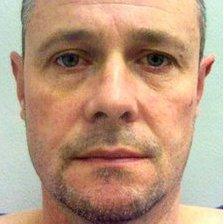PM wants web firms 'action' on child porn
- Published

Police found pictures of child abuse on the computer of Mark Bridger, the killer of five-year-old April Jones
David Cameron has called for "more action" from web companies to rid the internet of images of child sex abuse.
It "twists minds and is... a danger to children", the PM said in a statement.
Ahead of a government meeting with internet companies later this month, he said: "The time for excuses and blame is over - we must all work together."
In two recent murder trials, the killers of five-year-old April Jones and Tia Sharp, 12, were revealed to have viewed abusive images of children.
Research by the Child Exploitation and Online Protection Centre (CEOP) on a sample group of people investigated by police for viewing indecent images of children online found that more than half had committed "contact" child sexual offences.
Mr Cameron's statement said he was "sickened by the proliferation of child pornography".
"Internet companies and search engines make their living by trawling and categorising the web. So I call on them to use their extraordinary technical abilities to do more to root out these disgusting images."
He said there were "encouraging signs that the industry is willing to step up, increasing funding and technical support for organisations combating child sexual abuse imagery online.
"But I want more action," he said. "The safety of our children is at stake - and nothing matters more than that."
Zero-tolerance
Some campaigners want web search engines to default to the safest option - blocking access to legal as well as illegal sexual images.
This would force people to register to access such material, likely deterring many from doing so, it is argued.
But it has been suggested that some internet companies are reluctant to change their search settings, fearing a competitive disadvantage as users are driven to sites unwilling to change their policy.
One of the biggest internet companies, Google, says it has a zero-tolerance attitude on child sexual abuse images.
It says it always removes them when it is made aware, and reports the incident to the relevant authorities.
The PM's intervention comes amid a debate over how best to ensure that school sex education keeps pace with the proliferation of online pornography.
A report commissioned by the Office of the Children's Commissioner, and published last month, suggested that some children are exposed to pornography while still at primary school.
It argued that urgent action is needed to develop children's resilience to extremely graphic types of porn and lessons on relationships should start in primary school.
The government has said its curriculum changes will teach children from the age of five to stay safe online.
Google and other internet companies, such as BT, have been summoned to a meeting with the Culture Secretary Maria Miller and the prime minister's adviser, Tory MP Claire Perry, on 17 June.
- Published6 June 2013
- Published5 June 2013
- Published31 May 2013
- Published31 May 2013
- Published31 May 2013
- Published23 February 2013
- Published23 February 2013